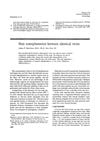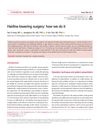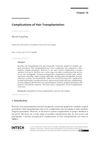 3 citations,
June 2004 in “Alternative and Complementary Therapies”
3 citations,
June 2004 in “Alternative and Complementary Therapies” The document concludes that hair loss is influenced by genetics and other factors, and while treatments like finasteride can help, they have limitations and side effects.
 3 citations,
July 1997 in “Current problems in dermatology”
3 citations,
July 1997 in “Current problems in dermatology” Hair restoration surgery has evolved over time, with a focus on natural-looking results and managing patient expectations, while also considering potential complications and the lifelong progression of male pattern baldness.
 2 citations,
November 2023 in “Curēus”
2 citations,
November 2023 in “Curēus” Platelet-rich plasma (PRP) speeds up skin wound healing and has potential in medical and cosmetic uses.
1 citations,
December 2017 in “Annals of Dermatological Research” Accurate early diagnosis of Lichen Planopilaris is crucial to prevent permanent hair loss.
 1 citations,
May 2017 in “InTech eBooks”
1 citations,
May 2017 in “InTech eBooks” The document explains the causes, types, diagnosis, and treatments of hair loss, and its psychological impact, especially on women.
 1 citations,
January 2014 in “Health Renaissance”
1 citations,
January 2014 in “Health Renaissance” Pseudopelade of Brocq is hard to diagnose and treat, with limited effective options.
 1 citations,
October 2008 in “Expert Review of Dermatology”
1 citations,
October 2008 in “Expert Review of Dermatology” Frontal Fibrosing Alopecia is a slowly progressing hair loss condition, likely underdiagnosed, with ineffective treatments, needing more research to understand it fully.
 1 citations,
January 2001
1 citations,
January 2001 Micrografting is the most effective surgical method for permanent hair restoration.
 1 citations,
August 1988 in “Journal of The American Academy of Dermatology”
1 citations,
August 1988 in “Journal of The American Academy of Dermatology” Hair transplantation between identical twins can successfully treat severe, nonprogressive hair loss due to follicular aplasia.
 1 citations,
November 1953 in “Archives of Dermatology”
1 citations,
November 1953 in “Archives of Dermatology” The document discusses various challenging skin conditions and their treatments.
 October 2024 in “Frontiers in Neurology”
October 2024 in “Frontiers in Neurology” Interventional embolization is effective for treating scalp arteriovenous fistula but can cause complications like swelling and hair loss.
 October 2024 in “Frontiers in Nutrition”
October 2024 in “Frontiers in Nutrition” Vitamin D deficiency is common in people with certain types of hair loss, like alopecia areata and female pattern hair loss.

Regenerative cosmetics can improve skin and hair by reducing wrinkles, healing wounds, and promoting hair growth.
 May 2024 in “International Journal For Multidisciplinary Research”
May 2024 in “International Journal For Multidisciplinary Research” The herbal hair cream helps protect and improve hair health.
 April 2024 in “Skin research and technology”
April 2024 in “Skin research and technology” Adding stromal vascular fraction to platelet-rich plasma injections did not significantly improve hair growth in androgenetic alopecia treatment.

The article suggests that patients with Frontal Fibrosing Alopecia may have more contact allergies, but it doesn't prove that allergies cause the condition.
 February 2024 in “Frontiers in physiology”
February 2024 in “Frontiers in physiology” Hair follicle stem cells help skin heal and grow during stretching.
 November 2023 in “International journal of biology, pharmacy and allied sciences”
November 2023 in “International journal of biology, pharmacy and allied sciences” Herbal treatments can help with hair problems, but more research is needed.
 October 2023 in “Journal of cosmetic dermatology”
October 2023 in “Journal of cosmetic dermatology” Timely treatment and prevention are crucial to avoid serious complications in hair transplants.
 September 2023 in “Ain Shams medical journal”
September 2023 in “Ain Shams medical journal” 31% of female high school students in Minia have hair loss from tight hairstyles, which can become permanent if not treated early.

Non-invasive methods can effectively diagnose and manage alopecia areata.
 March 2023 in “Journal of clinical review & case reports”
March 2023 in “Journal of clinical review & case reports” Frontal Fibrosing Alopecia mainly affects postmenopausal Mexican women, requiring early detection to prevent permanent hair loss.
 January 2023 in “Springer eBooks”
January 2023 in “Springer eBooks” Using one's own blood platelets and fat can improve facial and hair appearance without surgery.
 December 2022 in “The Journal of Cosmetic Medicine”
December 2022 in “The Journal of Cosmetic Medicine” Hairline-lowering surgery effectively reduces a high hairline with immediate, noticeable results.

A girl with Crohn's disease developed hair loss due to her increased medication, a rare side effect seen in some children.
 June 2019 in “Pediatric Dermatology”
June 2019 in “Pediatric Dermatology” Alopecia in patients with epidermolysis bullosa varies in severity and is often caused by skin blistering or trauma.
 July 2018 in “Elsevier eBooks”
July 2018 in “Elsevier eBooks” New hair loss treatments show promise, but more research is needed to confirm their effectiveness.
 September 2017 in “Journal of Investigative Dermatology”
September 2017 in “Journal of Investigative Dermatology” HIF-1A may aid hair growth, Backhousia citriodora improves skin, autologous cells stabilize hair loss, infrared thermography assesses alopecia, and a new treatment preserves hair.
 May 2017 in “InTech eBooks”
May 2017 in “InTech eBooks” Hair transplantation can lead to complications like pain, swelling, and rare serious issues, but risks can be reduced with careful practices.
 May 2017 in “InTech eBooks”
May 2017 in “InTech eBooks” Early treatment of children's hair loss, which can be caused by various factors, is important due to its emotional impact.




























